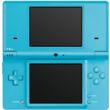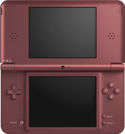Difference between revisions of "Nintendo DSi"
WarioFan63 (talk | contribs) |
WarioFan63 (talk | contribs) |
||
| Line 37: | Line 37: | ||
====DSi Sound==== | ====DSi Sound==== | ||
| + | |||
| + | [[Image:DSiSound.png|right|100px]] | ||
| + | |||
| + | DSi Sound is a built-in application for the Nintendo DSi. It allows the user to record and modify their own sound clips as well as modify music stored on the SD Card. Modifications include changing the pitch and speed of the clip, playing the clip backwards, and filtering the sound. If music stored on the SD Card is being played, the option for a Visualizer appears. The user can scroll through several different visualizers including ones based off [[Excitebike]] and [[Super Mario Bros.]] and is also able to interact with all of them. | ||
===Firmware=== | ===Firmware=== | ||
Revision as of 19:17, 4 January 2010
 
| |
| Manufacturer | Nintendo |
| Type | Handheld |
| Generation | Seventh |
| Media | DS and DSi Game cards |
| Storage | Cartridge save, 256 MB of internal memory |
| Connectivity | Wi-Fi and local wireless |
| Online Service | Nintendo Wi-Fi Connection, LAN |
| Release Date | JP November 1, 2008 AU April 2, 2009 EU April 3, 2009 US April 5, 2009 |
| Top Game | Flipnote Studio |
| Compatibility | Nintendo DS |
| Predecessor | Nintendo DS |
The Nintendo DSi is a modification of the Nintendo DS featuring several new improvements and additions as well as a few drawbacks.
Features
Differences from the Nintendo DS
This DSi's primary new features are the inclusion of two 0.3 megapixel cameras facing toward and away from the user. An SD Card can be inserted on the right side of the DSi. The lights indicating battery strength and whether or not the system is charging have been moved to the left hinge with the addition of a third light indicating WiFi strength. Much like the Wii there is a customizable menu screen where one can move around built-in and downloaded applications and games. Unlike the Wii's 4x4 channel grid, the DSi's menu is a single straight line. Also unlike the Wii, the slot for the inserted game is able to be moved.
Other improved functions include the screens, which are 0.25 inches larger then that of the original and Lite models, covered by a slick matte finish. The power button is a circular button on the bottom left of the Touch Screen rather then a rectangular button on the upper right or a power switch on the right side. The power button must be held down in order to shut down the system, if it's quickly pressed it will rest back to the menu screen. Furthermore when changing system settings or exiting Pictochat, the system does not need to reset before using it again. This also allows for hot swapping games while the system is still on. Sound quality has improved slightly with the help of better speakers. There are now five settings of brightness as opposed to the DS Lite's four.
The DSi does have a few drawbacks however. The most noticeable difference is the lack of a Game Boy Advance slot rendering the DSi unable to play any games from that library as well as DS games that utilized the slot such as Guitar Hero: World Tour. The battery length also takes a hit from the DS's with a difference of 5 hours, give or take depending on the brightness setting. Also while the DSi is capable of playing DS games from other regions, it is unable to play DSi-enhanced or DSi-specific games from other regions. It is possible, however to play an imported DSi-enhanced game on either the original or DS Lite models.
DSi Camera
DSi Sound
DSi Sound is a built-in application for the Nintendo DSi. It allows the user to record and modify their own sound clips as well as modify music stored on the SD Card. Modifications include changing the pitch and speed of the clip, playing the clip backwards, and filtering the sound. If music stored on the SD Card is being played, the option for a Visualizer appears. The user can scroll through several different visualizers including ones based off Excitebike and Super Mario Bros. and is also able to interact with all of them.
Firmware
The DSi is set up to be able to receive firmware updates from time to time. So far, the only noticeable firmware update has been the ability to upload DSi Photos to Facebook.
DSiWare
The primary source for exclusive DSi games can be found in the DSi Shop. DSiWare downloads are sorted under 4 categories representing their price points: Free, 200, 500, and 800+. Note that 800+ allows for more expensive games with 800 as the lowest price point. Downloads can range from simple applications like clocks and calculators to standard games like platformers and puzzlers. Some DSiWare games are bits of existing Game Boy Advance or Nintendo DS games or ports of older games from various consoles.
Backwards Compatiblity
The Nintendo DSi lacks a second slot like it's predecessors rendering it unable to play Game Boy Advance games as well as DS games that utilized the second slot to enhance the experience. Regardless, the DSi is compatible with every other existing DS game, including ones from different regions.
Designs
Nintendo DSi
The Nintendo DSi is the first and smaller design of the DSi sub-family. It's lighter weight and shape makes it more portable. All other additions are noted above.
Nintendo DSi XL
The DSi XL (LL in Japan) is a much larger edition of the DSi primarily geared for the older market. Keeping with this mindset, the DSI XL models feature a classier design as well as classier colors. Sporting all the same features as the DSi, the DSi XL's new features lie mostly in the size. The screens are now 4.2 inches each and when fully opened, it is roughly the same size as DVD case. Although the default stylus is already larger then previous designs, the DSi XL comes with another even larger stylus resembling a ballpoint pen. It also comes preloaded with certain DSiWare programs such as Brain Age Express titles to appeal to the older demographic. The DSi XL's size make it far less portable and much heavier then any of it's DS and Game Boy predecessors.
See Also
| Nintendo Systems |
|---|
| NES - Super NES - Nintendo 64 - GameCube - Wii - Wii U - Switch Game Boy - Game Boy Color - Game Boy Advance - Nintendo DS (DSi) - 3DS (New 3DS) Arcade - Color TV Game - Game & Watch - Virtual Boy |
